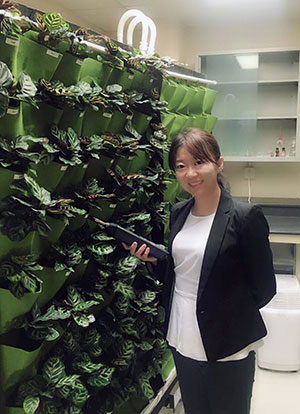UWs Liping Wang Receives NSF CAREER Award to Study Indoor Green Solutions to Climate Change
Published March 06, 2020

A University of Wyoming researcher received a big boost to help her study how to combat the environmental challenges of climate change.
Liping Wang, an assistant professor in UW’s Department of Civil and Architectural Engineering, hopes to shed some light on the subject through an approximately $500,000 Faculty Early Career Development (CAREER) Program Award she recently received from the National Science Foundation (NSF).
The project is titled “Commercial Building Indoor Greenery Systems’ Effects on Thermal Environment and Occupant Comfort on Climate Change.” The grant began Feb. 15 and runs through March 31, 2025.
The overarching research goal is to quantify the effects of indoor greenery systems on building energy consumption and occupant thermal comfort through experiments and integrated modeling.
“The environmental challenges of climate change increase the energy use and peak demands of buildings. This interdisciplinary research will quantify the contribution of indoor greenery systems, such as living walls, to building energy efficiency,” Wang says. “The knowledge gained in this study will form the scientific foundation of design guidance for architects, interior designers and engineers on indoor greenery systems -- and will promote the integration of indoor greenery with HVAC systems for energy efficiency in future buildings.”
Wang and her students will create a thermal model for indoor greenery systems that predicts evapotranspiration rates and the thermal interactions with the indoor environment, and validate the model based on measurements from lab experiments.
Her group also will identify the relationship between thermal comfort and leaf-to-floor area ratio and evapotranspiration for spaces with indoor greenery systems through thermal comfort experiments. The influence of indoor greenery systems on building performance will then be quantified through a coupled modeling approach that combines building energy simulation and indoor greenery system models. The developed thermal model for indoor greenery systems and the integrated modeling approach can contribute to other domains, such as vertical farming and horticulture, Wang says.
Spreading Knowledge
As part of the NSF CAREER Award, Wang will incorporate integrated educational activities such as experiments, design competitions and summer camps into curricula for middle/high school and university students.
“The educational goal is to enhance energy efficiency and sustainability education,” Wang says.
The CAREER Program offers the NSF’s most prestigious awards in support of junior faculty who exemplify the role of teacher-scholars through outstanding research, excellent education and the integration of education and research within the context of the mission of their organizations. Such activities should build a firm foundation for a lifetime of leadership in integrating education and research.
“My long-term career goals are to advance the frontier knowledge about emerging technologies for energy efficiency to mitigate climate change, and to engage future generations for a sustainable, healthy built environment,” she says. “The outcomes of this project will provide a foundation for my long-term career.”
The Environmental Sustainability Program in the Division of Chemical, Bioengineering, Environmental and Transport Systems within the NSF recommended Wang for the award. Budgeted over five years, the grant funding will support two Ph.D. students to conduct the research, as well as travel costs and supplies.
Wang’s areas of expertise include building energy simulation; fault detection and diagnosis; and control optimization for HVAC systems.
She received her Ph.D. at the National University of Singapore, and her master’s degree and bachelor’s degree, both from Xi’an University of Architecture and Technology in China.
“Ultimately, my research and educational efforts will have a tangible positive impact on future generations, scientific communities and industries toward a resilient and sustainable built environment,” Wang says.

